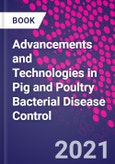Advancements and Technologies in Pig and Poultry Bacterial Disease Control provides the most up-to-date knowledge on the tools and technologies used in the economics, prevention, monitoring and control of the most important bacterial diseases in these two important livestock species. Written by international experts in veterinary medicine, veterinary science, agricultural economics and environmental monitoring, this book provides state-of-the-art information regarding the application of technology to the prevention and control of bacterial disease in pigs and poultry. It presents the most up-to-date information on the major bacterial pathogens, why they are important, their epidemiology, pathogenesis and molecular basis of their virulence.
Additional sections examine how genomic sequencing addresses the development of disease biomarkers for faster and highly specific diagnosis and how next generation sequencing can identify good and bad microflora. This book will be a valuable resource for veterinarians, epidemiologists, animal scientists, technologists, and researchers studying precision livestock farming. Students in veterinary, animal science and bio-science courses will also find it useful for its coverage of diseases and monitoring tools.
Please Note: This is an On Demand product, delivery may take up to 11 working days after payment has been received.
Table of Contents
1. The economic cost of bacterial infections
2. Bacterial diseases in pigs and poultry: Occurrence, epidemiology and biosecurity measures
3. Bacterial pathogenesis
4. Immunity to bacteria
5. Laboratory diagnosis of bacterial infections
6. Environmental monitoring and prediction of diseases
7. Bacterial diseases in pigs
8. Bacterial diseases in chickens
9. Antimicrobial resistance in the farm environment
10. Monitoring the microbiota in chickens and pigs








